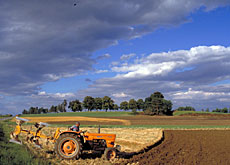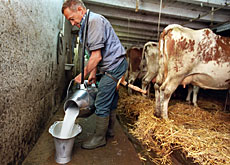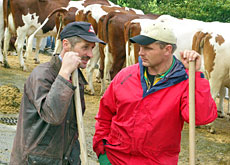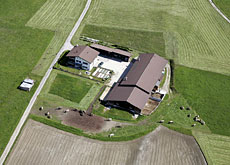OECD calls for farming reform

Swiss agricultural subsidies are the third highest in the world, too much according to the Organisation for Economic Co-operation and Development (OECD).
In its 2007 report on its members’ farming policies, the Paris-based organisation said subsidies to prop up domestic prices had dropped significantly in Switzerland but there was still room for improvement.
The OECD pointed out that in recent years support has globally shifted away from measures linked to specific commodities. But production-linked measures still dominate subsidies in most countries.
“Further reform is needed – both to improve the domestic performance of farm policies and to contribute to more open markets for trade in agriculture and food products,” said Stefan Tangermann, the organisation’s director for trade and agriculture.
The OECD praised Switzerland’s efforts to reform its farming sector but added that more efforts were needed to lower prices further.
But Jacques Bourgeois, director of the Swiss Farmers’ Association (SFA), says the OECD does not understand how the country’s agricultural system works.
“If you look at the financing Swiss agriculture receives, much of it is for direct payments set out in a constitutional mandate approved by voters in 1996,” he told swissinfo. “Farming is no longer just about producing food, but also looking after our landscapes and natural resources.”
But the OECD warned that too little of this financial support was being used to answer consumer concerns such as protecting the environment, animal welfare or biological agriculture.
Bourgeois disagrees. “Switzerland has taken a leading role in reforming agriculture. We are meeting consumer expectations,” he said. “There are also government polls that show the population supports Swiss agricultural policy.”
Insufficient
Switzerland offers the third-highest subsidies among OECD members, accounting for 66 per cent of farmers’ incomes between 2004 and 2006. Only Iceland and Norway pay out more.
The average is 34 per cent for the European Union, 11 per cent in the United States and five per cent in Australia.
The OECD says the Swiss figure has fallen by 12 per cent over the past 20 years, a “welcome evolution” but still insufficient. Agricultural subsidies in Switzerland are equivalent to 1.6 per cent of the country’s gross domestic product.
Production and consumer prices have also dropped. Two decades ago Swiss prices were five times the worldwide average; today they are just double.
But Bourgeois reckons it would be unfair to expect farmers to drop their prices any further.
“I don’t think any other economic sector has undergone as many changes in recent times,” he said. “Six to eight farms close for business every working day in Switzerland.”
swissinfo
In 2006, financial support for farmers in the 36 OECD nations reached $268 billion, around 27% of agricultural income.
The EU spent $138 billion on its farmers, the US $30 billion.
Swiss farmers have suffered a drop in income of at least ten per cent in the past decade.
Thousands of farms – usually on the verge of bankruptcy – have been sold. From more than 92,000 farms in 1990, there were just over 70,000 left by 2000.
Many of the remaining ones survive only because their farmers have taken up a second occupation. Farms with a surface of more than 20 hectares have bucked this trend though, with their numbers increasing.
Swiss farmers need SFr2.5 billion ($1.96 billion) in direct payments or state subsidies every year, whether or not they face competition.
Some estimates suggest that supporting farming costs the Swiss taxpayer SFr4 billion annually.
Direct payments have the advantage of not simply rewarding overproduction, and can selectively promote sectors of farming working in line with Swiss agriculture policy, for instance, organic farming.

In compliance with the JTI standards
More: SWI swissinfo.ch certified by the Journalism Trust Initiative



You can find an overview of ongoing debates with our journalists here . Please join us!
If you want to start a conversation about a topic raised in this article or want to report factual errors, email us at english@swissinfo.ch.